Friday, March 27, 2009
Saturday, March 21, 2009
Band History 101
Introduction:
In my career I have had the great good fortune to have met, played for and learned from some legends and giants in the music industry. The Cleveland Orchestra’s Summer Home, Blossom Music Center has a concert band comprised of some orchestra members and other professionals from Northeast Ohio. I had the good fortune to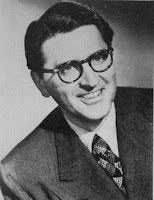 be a member of that band when Meredith Wilson was the Director. For those that don’t know, Meredith Wilson wrote, among other things, ‘The Music Man.’ He was also the piccolo player in the Sousa Band. Mr. Wilson was inspired to write ‘The Music Man’ partly by the life of Lynn Sams.
be a member of that band when Meredith Wilson was the Director. For those that don’t know, Meredith Wilson wrote, among other things, ‘The Music Man.’ He was also the piccolo player in the Sousa Band. Mr. Wilson was inspired to write ‘The Music Man’ partly by the life of Lynn Sams.
←MeredithWilson
Lynn Sams was a salesman for the Conn Corporation in the early 1900’s and a founding member of the American Bandmasters’ association. Although I never had the opportunity to meet Sams, I did know one of his contemporaries who also went from school to school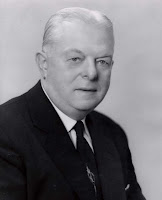 establishing bands and turning them over to a bandmaster he would hire. Charlie Gorby was one of these gentlemen. (http://www.lib.umd.edu/PAL/SCPA/ABA/Sams/Sams.html)
establishing bands and turning them over to a bandmaster he would hire. Charlie Gorby was one of these gentlemen. (http://www.lib.umd.edu/PAL/SCPA/ABA/Sams/Sams.html)
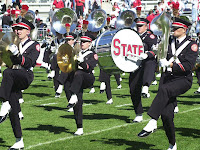 Football:
Football:
One of my students told me he had a great relationship with the football coach and in fact, the Music Boosters were given the concessions at football games by the coach. I asked how he had such a great relationship with the coach. He told me that when he started, he went to a football practice and sat in the bleachers. The coach came over and asked if he was a parent. When he said that he was the band director, the coach was surprised and asked why. “Well, we will be playing at all the games. I though I’d check out the team that I’ll be routing for.” They went out for coffee where the coach said the band was important to the morale of the team.
Did you ever ask the football coach to guest conduct? You know, one of those special marches.
Community Outreach:
Jacque Dillon, an industry legend and pioneer string teacher told me she had frequent requests to take ensembles out for performances in the community. Jackie said it is nice to play at nursing homes but her priorities were to “perform where the votes were.” She never turned down the luncheon requests at Rotary Club and the like.
North Allegheny High School has a huge string ensemble called ‘Strolling Strings’. They are frequent performers at Rotary and Kiwanis luncheons. The students stroll from table to table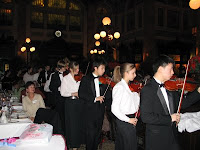 with as few as 12 instrumentalists to as many as 200. Repertoire includes Pachelbel's "Canon in D," Tchaikovsky's "Sleeping Beauty Waltz," and Strauss's "Emperor Waltz," and folk medleys. Kiwannis members always support school levies and encourage their own students to play string instruments.
with as few as 12 instrumentalists to as many as 200. Repertoire includes Pachelbel's "Canon in D," Tchaikovsky's "Sleeping Beauty Waltz," and Strauss's "Emperor Waltz," and folk medleys. Kiwannis members always support school levies and encourage their own students to play string instruments.
Soap Box:
Remember, there is strength in numbers. And job security too.
If you believe in what you’re doing, shouldn’t it be required of every student in the school?
Not that it will be, but what a great premise from which to start.
Who asks your students’ parents if the student will be continuing in band?????
The Music Store! It is a financial commitment.
Keep in mind the music store is your ally. They live and die with your success.
“Decades from now, no one will remember how many notes your first clarinet missed. No one will remember your rating at state contest. But how you influence your students will impact the quality of civilization for generations.” Apologies to Dr. Tim if I paraphrased.
Thank you all for what you do.
Richard Barth
Have stories to add?I invite you, the band director, to share additional stories that need to be shared with future generations. We tend to think our music programs are an entitlement. As we understand where they came from, we may learn some great tricks for keeping them going. Please keep stories to one short paragraph. Add a picture if you like. I’ll post as many as I can.
In my career I have had the great good fortune to have met, played for and learned from some legends and giants in the music industry. The Cleveland Orchestra’s Summer Home, Blossom Music Center has a concert band comprised of some orchestra members and other professionals from Northeast Ohio. I had the good fortune to
 be a member of that band when Meredith Wilson was the Director. For those that don’t know, Meredith Wilson wrote, among other things, ‘The Music Man.’ He was also the piccolo player in the Sousa Band. Mr. Wilson was inspired to write ‘The Music Man’ partly by the life of Lynn Sams.
be a member of that band when Meredith Wilson was the Director. For those that don’t know, Meredith Wilson wrote, among other things, ‘The Music Man.’ He was also the piccolo player in the Sousa Band. Mr. Wilson was inspired to write ‘The Music Man’ partly by the life of Lynn Sams.←MeredithWilson
Lynn Sams was a salesman for the Conn Corporation in the early 1900’s and a founding member of the American Bandmasters’ association. Although I never had the opportunity to meet Sams, I did know one of his contemporaries who also went from school to school
 establishing bands and turning them over to a bandmaster he would hire. Charlie Gorby was one of these gentlemen. (http://www.lib.umd.edu/PAL/SCPA/ABA/Sams/Sams.html)
establishing bands and turning them over to a bandmaster he would hire. Charlie Gorby was one of these gentlemen. (http://www.lib.umd.edu/PAL/SCPA/ABA/Sams/Sams.html)
←Lynn Sams
Free Sousaphone:Charlie Gorby told me he could get parents to buy flutes, clarinets, trumpets and 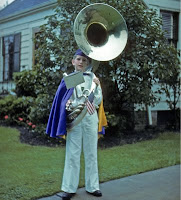 trombones. But when it came to the bigger instruments, he turned to the local Kiwannis Club. After getting the Club to purchase a new Sousaphone, Charlie assembled the band on the football field at half time. The Sousaphone player marched on with no instrument. An announcement was made that Kiwanis had a presentation. The president of the club carried out a Sousaphone and placed it on the shoulder of the Sousaphone player. Can you imagine the publicity for the club and the thrill for the president. Next year the club came to Charlie and asked “What can we buy for you this year?”
trombones. But when it came to the bigger instruments, he turned to the local Kiwannis Club. After getting the Club to purchase a new Sousaphone, Charlie assembled the band on the football field at half time. The Sousaphone player marched on with no instrument. An announcement was made that Kiwanis had a presentation. The president of the club carried out a Sousaphone and placed it on the shoulder of the Sousaphone player. Can you imagine the publicity for the club and the thrill for the president. Next year the club came to Charlie and asked “What can we buy for you this year?”
 trombones. But when it came to the bigger instruments, he turned to the local Kiwannis Club. After getting the Club to purchase a new Sousaphone, Charlie assembled the band on the football field at half time. The Sousaphone player marched on with no instrument. An announcement was made that Kiwanis had a presentation. The president of the club carried out a Sousaphone and placed it on the shoulder of the Sousaphone player. Can you imagine the publicity for the club and the thrill for the president. Next year the club came to Charlie and asked “What can we buy for you this year?”
trombones. But when it came to the bigger instruments, he turned to the local Kiwannis Club. After getting the Club to purchase a new Sousaphone, Charlie assembled the band on the football field at half time. The Sousaphone player marched on with no instrument. An announcement was made that Kiwanis had a presentation. The president of the club carried out a Sousaphone and placed it on the shoulder of the Sousaphone player. Can you imagine the publicity for the club and the thrill for the president. Next year the club came to Charlie and asked “What can we buy for you this year?”
A tuba acquisition success story:
Alex Cauthen, tubist in the Dallas Wind Symphony used to teach high school. He knew that Marching Band was ‘the tail that wagged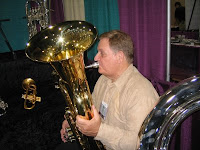 the dog’ so when he needed a new concert tuba, he asked the principal for a ‘rehearsal
the dog’ so when he needed a new concert tuba, he asked the principal for a ‘rehearsal
Sousaphone’ for the ‘off-season’.
Alex Cauthen, tubist in the Dallas Wind Symphony used to teach high school. He knew that Marching Band was ‘the tail that wagged
 the dog’ so when he needed a new concert tuba, he asked the principal for a ‘rehearsal
the dog’ so when he needed a new concert tuba, he asked the principal for a ‘rehearsalSousaphone’ for the ‘off-season’.
Before there was a High School Band:
Another of the original Harold Hills I had the privilege to know was Charlie Holmes. One of his pet peeves was band directors who would not march in Summer parades or for Bond Issue parades. Charlie said, “These young directors do not understand that when I started schools did not have bands. We had orchestras to play classical music as part of the well-rounded education. It was not until I put a band on the football field at half time that I justified the existence of my band. Prior to that we had to rehearse after school.”
Tip:Don’t invite the administration to your concerts. Reserve the first row for them and the school board.
List their names in the program and tell them you will invite them to stand and be recognized right after intermission. (Remember board members are elected.)
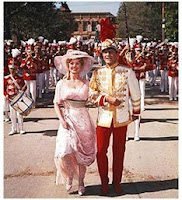 Recruiting:
Recruiting:
Doug McCullough took his Beavercreek High School band to Disney World. Doug also took a list of names and addresses of all the 4th graders. He had the seniors send post cards home about what a great time they were having at Disney World with the high school band. Next year his recruiting went through the roof.
(River City’s gonna have a boys’ band! Don’t know what that means? Watch the ‘Music Man’. I like the old one the best.)
Another of the original Harold Hills I had the privilege to know was Charlie Holmes. One of his pet peeves was band directors who would not march in Summer parades or for Bond Issue parades. Charlie said, “These young directors do not understand that when I started schools did not have bands. We had orchestras to play classical music as part of the well-rounded education. It was not until I put a band on the football field at half time that I justified the existence of my band. Prior to that we had to rehearse after school.”
Tip:Don’t invite the administration to your concerts. Reserve the first row for them and the school board.
List their names in the program and tell them you will invite them to stand and be recognized right after intermission. (Remember board members are elected.)
 Recruiting:
Recruiting:Doug McCullough took his Beavercreek High School band to Disney World. Doug also took a list of names and addresses of all the 4th graders. He had the seniors send post cards home about what a great time they were having at Disney World with the high school band. Next year his recruiting went through the roof.
(River City’s gonna have a boys’ band! Don’t know what that means? Watch the ‘Music Man’. I like the old one the best.)
Retention:
Close your eyes and think about the first time you were on stage.
Get your kids on stage after 8 weeks. No matter how simple the concert, a Christmas program for Grandma and Aunt Jane will go a long way to retention, both for the student and the parent.
Other Acquisitions:
In the 60’s, The Fifth Army Band did a recording of the music of Vincent Pershicetti. Rather than put his own picture on the record jacket, the director used pictures of Pershicetti and General Michaelis. General Michaelis was replaced by General Mock who wanted to see a record with his own picture on the jacket. The band director showed him a pile of recording equipment and said “We could do an even better recording if we had somewhere to install this equipment.” The next day the Army Corps of Engineers came to install a new studio.
Whose picture is on that new CD you just made?
Band Boosters:Many groups are called band parents. Are alumni and others in the community not welcomed? I know of one group that changed the name to band boosters, invited alums and senior citizen groups to join. (Board positions were limited only to parents). The extra membership dues bought two new piccolos and brought in a bigger audience from the senior center.
The Athletic Department:My wife and I served a two year stint as president of music boosters. We were told that athletics got all the money because the administrators were all jocks. I made a visit to the principal, the head of curriculum and the vice principal. In a non-confrontational meeting with each, I expressed that I represented 220 Music Boosters and we were grateful for the support that the Music Department had received and made a pitch for more. In casual conversation it turned out that the principal had played clarinet in his high school band, the vice principal had played trumpet in his college marching band and the head of curriculum, although he had no back ground in music himself, had two children in the choir.
Did you ever ask the principal to guest conduct? The president of the School Board? The mayor?
Close your eyes and think about the first time you were on stage.
Get your kids on stage after 8 weeks. No matter how simple the concert, a Christmas program for Grandma and Aunt Jane will go a long way to retention, both for the student and the parent.
Other Acquisitions:
In the 60’s, The Fifth Army Band did a recording of the music of Vincent Pershicetti. Rather than put his own picture on the record jacket, the director used pictures of Pershicetti and General Michaelis. General Michaelis was replaced by General Mock who wanted to see a record with his own picture on the jacket. The band director showed him a pile of recording equipment and said “We could do an even better recording if we had somewhere to install this equipment.” The next day the Army Corps of Engineers came to install a new studio.
Whose picture is on that new CD you just made?
Band Boosters:Many groups are called band parents. Are alumni and others in the community not welcomed? I know of one group that changed the name to band boosters, invited alums and senior citizen groups to join. (Board positions were limited only to parents). The extra membership dues bought two new piccolos and brought in a bigger audience from the senior center.
The Athletic Department:My wife and I served a two year stint as president of music boosters. We were told that athletics got all the money because the administrators were all jocks. I made a visit to the principal, the head of curriculum and the vice principal. In a non-confrontational meeting with each, I expressed that I represented 220 Music Boosters and we were grateful for the support that the Music Department had received and made a pitch for more. In casual conversation it turned out that the principal had played clarinet in his high school band, the vice principal had played trumpet in his college marching band and the head of curriculum, although he had no back ground in music himself, had two children in the choir.
Did you ever ask the principal to guest conduct? The president of the School Board? The mayor?
 Football:
Football:One of my students told me he had a great relationship with the football coach and in fact, the Music Boosters were given the concessions at football games by the coach. I asked how he had such a great relationship with the coach. He told me that when he started, he went to a football practice and sat in the bleachers. The coach came over and asked if he was a parent. When he said that he was the band director, the coach was surprised and asked why. “Well, we will be playing at all the games. I though I’d check out the team that I’ll be routing for.” They went out for coffee where the coach said the band was important to the morale of the team.
Did you ever ask the football coach to guest conduct? You know, one of those special marches.
Community Outreach:
Jacque Dillon, an industry legend and pioneer string teacher told me she had frequent requests to take ensembles out for performances in the community. Jackie said it is nice to play at nursing homes but her priorities were to “perform where the votes were.” She never turned down the luncheon requests at Rotary Club and the like.
North Allegheny High School has a huge string ensemble called ‘Strolling Strings’. They are frequent performers at Rotary and Kiwanis luncheons. The students stroll from table to table
 with as few as 12 instrumentalists to as many as 200. Repertoire includes Pachelbel's "Canon in D," Tchaikovsky's "Sleeping Beauty Waltz," and Strauss's "Emperor Waltz," and folk medleys. Kiwannis members always support school levies and encourage their own students to play string instruments.
with as few as 12 instrumentalists to as many as 200. Repertoire includes Pachelbel's "Canon in D," Tchaikovsky's "Sleeping Beauty Waltz," and Strauss's "Emperor Waltz," and folk medleys. Kiwannis members always support school levies and encourage their own students to play string instruments. Soap Box:
Remember, there is strength in numbers. And job security too.
If you believe in what you’re doing, shouldn’t it be required of every student in the school?
Not that it will be, but what a great premise from which to start.
Who asks your students’ parents if the student will be continuing in band?????
The Music Store! It is a financial commitment.
Keep in mind the music store is your ally. They live and die with your success.
“Decades from now, no one will remember how many notes your first clarinet missed. No one will remember your rating at state contest. But how you influence your students will impact the quality of civilization for generations.” Apologies to Dr. Tim if I paraphrased.
Thank you all for what you do.
Richard Barth
Have stories to add?I invite you, the band director, to share additional stories that need to be shared with future generations. We tend to think our music programs are an entitlement. As we understand where they came from, we may learn some great tricks for keeping them going. Please keep stories to one short paragraph. Add a picture if you like. I’ll post as many as I can.
Friday, March 13, 2009
TMEA
Horn Maintenance
Brass Instrument Basic Care and Maintenance: French Horn(See separate page on re-stringing)DO NOT…Do NOT, if a valve is stuck, push on the lever. You will bend a lever or break a stem. French horn rotors are prone to ‘freeze up’ if left unused or if not well oiled. Grasp the stop arm around the center spindle and move it with your hand. If this doesn’t work, proceed to “un-sticking a valve” below.Do NOT boil your instrument or immerse it in hot water. It is important to wash your instrument periodically. Ignore web sites that suggest that instruments do not need to be cleaned. Germs can collect in the mouthpiece and mouthpipe. That said, do not over-react and boil the instruments. Do not put it in the dishwasher. Follow the steps below.Do NOT attempt to get a stuck mouthpiece loose with pliers or other devices not intended for this purpose. Pliers will harm the mouthpiece and when a mouthpiece cannot be dislodged with your own hand, chances are extremely high that you will twist or break the instrument itself with excessive force. Most music stores have a simple device called a mouthpiece puller made for the occasional stuck mouthpiece. Get thee to a music store. If you purchased or rented the instrument from the store they will pull the mouthpiece for a very nominal fee or perhaps no charge. They would much rather pull the mouthpiece as a service than have to cope with a damaged instrument.In the future, do not ‘pop’ the mouthpiece to put it in. Do insert with a slight gentle twist in one direction and extract with a twist in the opposite direction. (Most mouthpieces get stuck when the instrument is dropped. On rare occasion a mouthpiece gets stuck when the player tries to extract it by twisting aggressively in the same direction he used to insert it.)Do NOT wash the instrument with anything abrasive. Lacquered (D-500LQ, D-700LQ, and D-800LQ) have what is essentially a clear paint job protecting them from tarnish. Do not use any polish on lacquer. A soft cloth like old pajamas will usually do a superb job of wiping off finger prints. A glass cleaner like Windex can be used if necessary. Even a little valve oil on a cloth can be used for stubborn spots. The lacquer will last a lifetime if you wash your hands before handling the instrument and wipe finger prints off before putting the instrument away.Unlacquered instruments (D-780UL and D-880UL) can be polished with commercially available brass polish like BrassoTM.Mouthpieces are silver plated and can be polished with silver polish but toothpaste does a great job and is very safe. Once a month is plenty except during cold a flu season. An alcohol swab or mouthwash will not harm the mouthpiece. There is a brush made especially for the inside bore of the mouthpiece. See below. An electric razor brush also works but get one dad is done with.Do NOT remove any parts without securing them in a safe place. Piston valves need to be removed to be cleaned. But if they roll off the kitchen counter and land on the tile floor, the resultant dent may render them inoperable. Get a small box to put them in. I like to place them in a box laying at an angle with the valve stem on the side of the box. This way they do not roll around but they also do not pick up any dirt or lint.Likewise slides need a secure place if removed. Do NOT use petroleum jelly (VaselineTM) to lubricate slides. It has many useful purposes but lubricating brass slides is not one of them. Your music store has many fine inexpensive slide greases. They are a good investment. (Having a stuck slide professionally pulled costs more than the grease.) There are many lubricants on the market made for other purposes that work well. If your teacher recommends one it is probably fine.The valve oil that came with your instrument will be all you need for the first month. Soon, however, it is wise to acquire some maintenance accessories. Your music store is a great source. They can show you how to use these. You already have some of these around the house.· Slide grease· A piece of absorbent (not polyester or synthetic), lint free cloth approximately 12” square. An old cotton handkerchief will do nicely. A piece of muslin from the fabric store is great.· A soft cloth for wiping finger prints off the outside of the instrument. Old pajamas or flannel from the fabric store, or an instrument polishing cloth from the music store.· Mouthpiece brush or electric razor ‘pipe-cleaner’ type brush.· Brass instrument bore brush specially made for French horn also known as a snake.· A small wooden or rawhide mallet.· A wooden dowel rod ca. ½” diameter and ca. 5” long.· French horn string. (Fishing line works well but it must be ‘braided’ and at least 50lb test. Depending on the brand and the braid, it may require 80lb test or more and newer thin lines may require special knots so as not to pull through the hole.) Knot this and cut to length in advance. Keep some in your case for emergencies.· A screwdriver that fits the rotor screws. A cheap screwdriver can be filed thin to fit and is better than a blade that is too narrow.· A quality rotor oil with a needle tip is not necessary but recommended for those that can use it responsibly.Recommended Maintenance:Weekly:1. Wash the mouthpiece with soap and water (or occasionally with toothpaste and water) at least once a week. This is for your own health. Use a mouthpiece brush or electric razor brush to clean the inside.2. Push all the slides all the way in. It is easy to forget to move these once the tuning is set, but grease can dry inside and ‘freeze’ the slides in place or crust at the end so that the slides cannot be pushed in all the way.3. Remove the tuning slide. Place it in a safe place. Wash the inside of the mouthpipe (the first tube long, bent tube on the horn that connects the mouthpiece to the tuning slide) with the flexible bore brush and soap and water. Rinse. Wipe the tuning slide free of grease with a paper towel. Wash it with the flexible bore brush. Re-grease and replace.Cleaning the mouthpipe is very important for several reasons:1.) Your health. This is where germs collect.2.) This is also where acids and salts collect. Soap neutralizes these. If not neutralized, brass deteriorization can occur.3.) Foreign substances can build up and after time restrict the air flow. (Brushing your teeth before playing is a good habit for the instrument and the player.)* It is a good idea to take everything apart, wash and re-grease once a year. This is also recommended initially if you are using a previously owned instrument. Follow all the instructions above but remove all four slides and immerse the body of what remains in luke warm soapy water. Rinse well. Wash and re-grease all the slides, oil the pistons etc.See the new horns from W. Nirschl at www.wnirschl.com
Subscribe to:
Posts (Atom)

